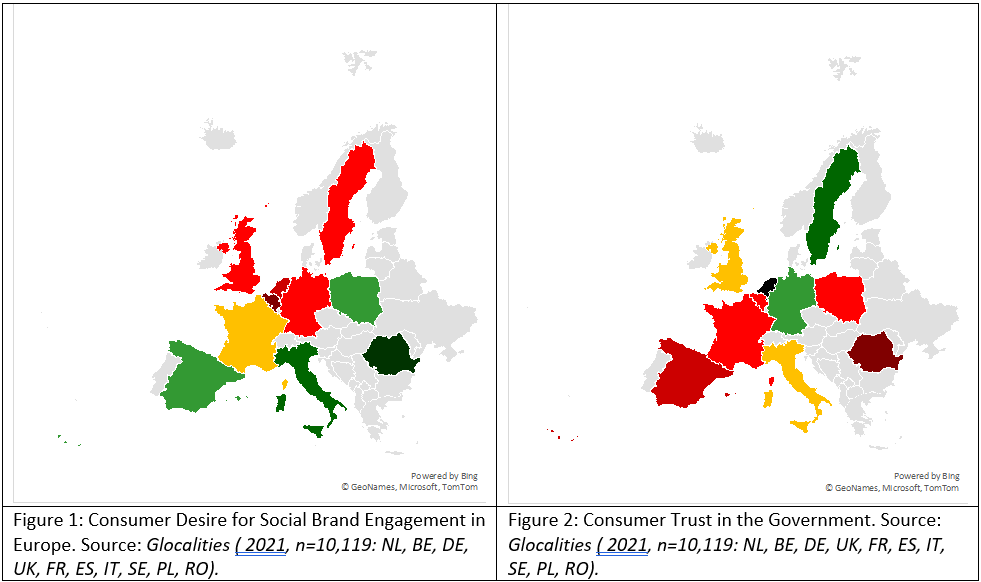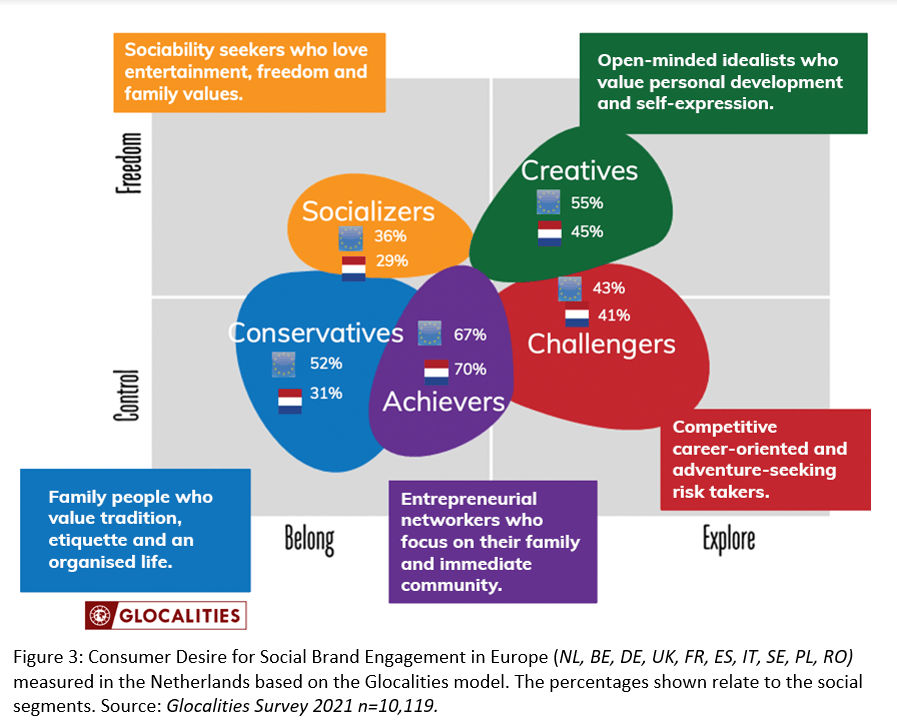
The Growing Popularity of Social Engagement for Brands Conceals the Presence of Differences in Consumer Preference
Social brand engagement is starting to become mainstream based on the assumption that consumers also expect such engagement from brands. Yet the international research agency Glocalities has shown that this isn’t necessarily the case for every consumer. There are marked differences per country in the extent to which the consumer expects a brand to adopt a socially responsible standpoint. And what is possibly more important: such differences in expected engagement are even more evident between target groups as defined by their consumer values pattern. Brands possessing good insight into what consumers expect of them regarding social responsibility are able to communicate more effectively with their target groups and thus develop stronger engagement with them.
The war in Ukraine shows how mainstream social brand engagement has already become. According to the Yale School of Management over 600 brands and companies have already curtailed their activities in Russia to some degree in protest against the war, with almost half (268) withdrawing from the Russian market completely. This is often at a high price: companies and brands can suffer significant losses as a result. Heineken estimated that the exceptional charges and impairment it will need to accept will total €400 million.[i]
This social relevance trend for brands has been developing for years and is not only visible in the current brand boycotting of Russia. For instance Shell advertises green energy from wind turbines, KLM offers travellers the opportunity to compensate the CO2 emission by planting trees.
Another way in which this social brand trend is being expressed is via Purpose, with companies defining an additional higher corporate goal other than financial gain. An increasing number of brands and companies are including Purpose in their mission statement. For instance Unilever talks about “Our purpose is to make sustainable living commonplace”[ii] and the Rabobank refers to itself as follows: “The Rabobank is a socially-responsible bank. We are committed to making a substantial contribution towards achieving wealth and prosperity in the Netherlands and to resolving the food issue worldwide”[iii]. In most of these cases companies assume that this is also what consumers are expecting from the companies and brands.
According to one of the most successful brand building experts Bruno Bertelli, Global Chief Creative Officer at Publicis[iv], it’s no longer even possible to build a strong brand without any form of social engagement: “Today, brands need to be relevant in society to also remain relevant in the lives of consumers.”
The worldwide trend surveys conducted by Glocalities confirm that social engagement among consumers has increased strongly in the last few years. And the Covid pandemic has also clearly given this trend an extra boost[v].
In Europe as many as half (49%) the consumers already consider that brands should take a stance regarding social injustice in society[vi]. Conversely a minority (13%) consider that brands should not become involved in this and the remainder (39%) do not (yet) have an opinion on the matter.
It’s interesting to see how marked the differences are between European consumers concerning the social engagement of companies. Consumer demand for a high level of brand engagement is especially strong in Romania (69%), Italy (59%), Poland (56%) and Spain (55%) - see Figure 1.

The Glocalities survey also shows that these are in fact the countries where trust in the government is relatively weak. This pattern is also evident worldwide. Where trust in the government is weak the consumer expects a relatively stronger social role to be played by brands and companies. Figure 2 shows the level of trust in the government and this largely reflects Figure 1.
The survey also shows that the desire for social brand engagement is clearly weaker in North-western Europe: this is 39% in the Netherlands, 43% in Germany and 44% in the UK (see Figure 1).
The differences are even more marked when taking account of the effect of consumer values on the importance of brand engagement. In Europe it is mainly the consumers we classify as Creatives (“Open-minded idealists who value personal development and self-expression”) and Achievers (“Entrepreneurial networkers who focus on their family and immediate community”) who have high scores for brand engagement (55% and 67% respectively). Conversely Socializers (“Sociability-seekers who love entertainment, freedom and family values”) and Challengers (“Competitive career-oriented and adventure-seeking risk takers”) have far lower scores for brand engagement (36% and 43% respectively).
In the Netherlands a similar division is also evident regarding brand engagement. High scores are also evident here for the Creatives and Achievers value segments (45% and 75%). It should be noted that in the Netherlands the Achievers represent only a small subgroup (4% of the population). The score for the Socializers segment is also relatively low in the Netherlands (29%). See Figure 3.

Insight into how much value your target group attaches to social brand engagement also provides insight into how you need to approach this as a brand. It’s not only the extent to which consumers value social brand engagement as a whole that’s important, because consumers are also concerned about the specific issues (topics) that brands consider important. To take the example of Heineken again, in Europe the Heineken consumer is shown to have relatively strong involvement with issues such as ‘protecting the environment’ (47% of Heineken consumers), ‘human rights’ (47%) and ‘corruption’ (33%). Conversely the McDonald’s consumer is relatively more sensitive to brand engagement issues such as ‘child protection’ (45% of McDonald’s consumers), ‘animal protection’ (38%) and ‘fighting poverty’ (35%).
So we see that social brand engagement and communicating the ‘Purpose’ of the company and the brand have become more mainstream. Yet it’s evident that clear differences exist regarding the extent to which this is in alignment with consumer perceptions. Marked differences are not only evident between countries, but are also seen within the individual countries. It’s also important here for attention to be paid to the specific topics that companies focus on in the context of their brand engagement.
Consumer brand engagement is clearly value-driven and wherever consumer values are concerned the following maxim applies: “On average, the average is wrong”. This is an important concept for brands to accept before they jump on the “Brand Engagement Trampoline”.
[i] https://www.theheinekencompany.com/newsroom/heineken-nv-announces-decision-to-leave-russia/
[ii] https://www.unilever.com/planet-and-society/
[iii] https://www.rabobank.com/nl/about-rabobank/profile/mission-strategy/index.html#:~:text=De%20Rabobank%20is%20een%20maatschappelijke,de%20klant%20en%20zijn%20omgeving.
[iv] https://www.brandingmag.com/martin-schiere/why-creative-friendly-data-makes-brands-more-relevant-with-bruno-bertelli-publicis/
[v] Two Faces of Covid Report:
[vi] Glocalities Research, 2021 n=10,119, NL, UK, BE, FR, ES, IT, DE, PL, RO, ES


